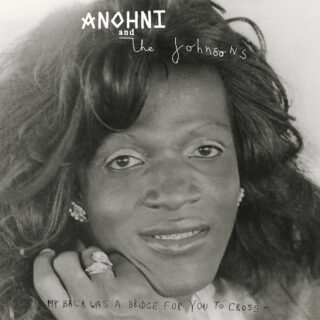ANOHNI & The Johnsons
My Back Was A Bridge For You To Cross
9/10
ALBUM OF THE WEEK

9/10
ALBUM OF THE WEEK
It’s head-turning, but returning to her ‘& The Johnsons’ suffix is also full of purpose, like everything ANOHNI does. This original moniker was first adopted in the early ’90s, when ANOHNI was a member of Blacklips, a New York drag collective that operated far away from the ‘daylight culture’ of the city. Then, she was more drawn to freakish visual art and ragged live performance. The songs came after, out of necessity, when an increasingly hostile right-wing government gradually scrubbed and sanitised the queer nightlife that already existed on the margins. She looked to figures like Marsha P Johnson for inspiration, hence ‘the Johnsons’.
Marsha P Johnson was a secret knowledge then, even in queer circles. Queer history wasn’t a given, and it still isn’t. At the height of the AIDS pandemic, as a culture began to vanish around her, ANOHNI was keenly aware of how easily the lives and art of marginalised groups could be flattened and forgotten. “People knew me to be a repository for a certain kind of information, especially information that reached back a little bit further into the imagination of a past,” she recounted to Art Forum recently.
On her sixth album, My Back Was A Bridge For You To Cross, ANOHNI reaches out to the past and the future simultaneously. There’s an emotional pureness to her songwriting, voice and lyrics that makes it feel as if the album is expanding through time as you listen. Written and recorded with producer Jimmy Hogarth alongside a tight studio band, the record has a no-frills one-take quality of an older era. The rawness is needed for these personal documentations of communal life.
Where 2016’s Hopelessness used blunt and specific lyrical references to contemporary politics and its atrocities, this album is more guarded. She hugs her central subjects close to her chests like painful memories and lost loves. Still, the instant emotional heft remains a constant. Like many of the best protest albums, My Back Was A Bridge For You To Cross is universal and multifaceted.
‘It Must Change’ blurs the lines between romantic love and political upheaval, all captured in ANOHNI’s commanding and vulnerable voice. She mirrors Gaye’s What’s Going On? in form, beckoning the audience to answer her question. What do you think is going on? What do you think must change? “The truth is that our love will ricochet through eternity,” she sings.
‘Go Ahead’ follows with a clattering argument. She’s defeated rather than defiant. “Go ahead and burn me down / Go ahead, kill your friends,” she screams. “I can’t stop you.” Death approaches throughout the album. Sometimes gently, as she looks back; sometimes with force. On ‘Sliver of Ice’, she stares into oblivion with the “taste of water” on her tongue. That feels like one of the more hopeful moments.
On ‘Can’t’, she’s swallowed by grief. The song is jubilant and raging, capturing the manic energy and denial that takes over in mourning. “I don’t want you to be dead,” she sings plainly, stuck on that thought as a band plays on. It’s a powerful and honest performance, subtle sax and string lines softening the edges around her.
Then there’s ‘Scapegoat’, a masterful highpoint of her bold and uncomfortably frank lyrical style, in which she imagines killing an unnamed scapegoat. It’s a queasy, slow-motion ballad that grows more anguished as it twists on. She lets herself become the villain and victim at once, through a ghostly, deadened vibrato. “It’s not personal,” she sighs. You think of all the scapegoats similarly punished for existing.
Instrumentally, the record is reserved and tasteful, leaving plenty of space for the writing to have the desired impact. Still, there’s interplay, and a cohesive approach that keeps you in its spell. There’s a sense of timelessness, too: the record would have had just as much power if ANOHNI were sitting at a piano 60 years ago. Take ‘It’s My Fault’, an eerie song of the shared ecological guilt that we place on ourselves; its jazz and folk inflections evoke Simone and Mitchell.
The record’s final third is weighty and existential, especially ‘Why Am I Alive Now?’, which explores survivors’ guilt, geological decay and end-of-days panic. In the background of the record, ANOHNI sees herself joining her fallen sisters, fading before our eyes. There’s hope in the closing moments, where she acknowledges the power of being part of a queer lineage. She speaks to us like a wise elder: “For me / You be free for me.”
Pain colours My Back Was A Bridge For You To Cross, but there’s also an abundance of life, and an outstretched hand. ANOHNI documents it all, to nourish those who move forward.